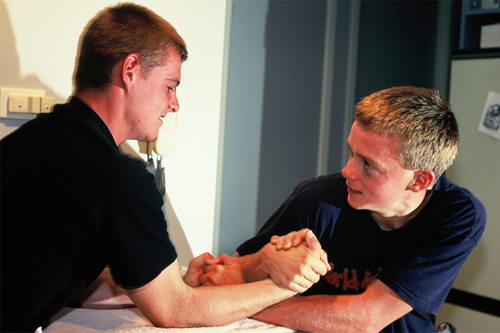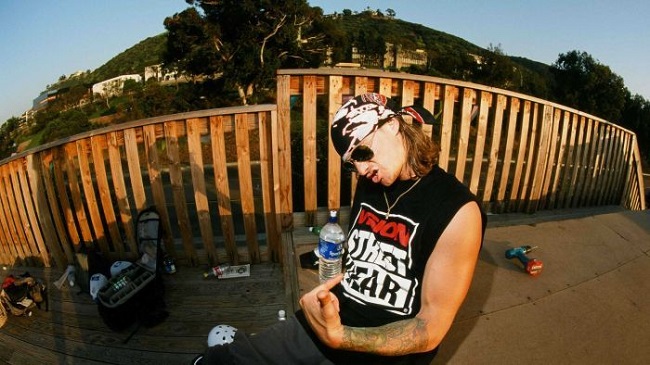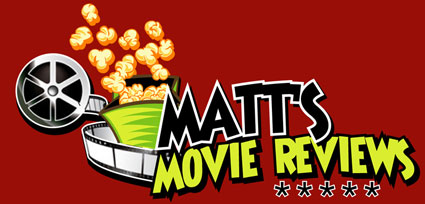Melbourne based director Eddie Martin has steadily become the premier Australian documentary filmmaker.
His first movie Jisoe - about the life of troubled graffiti artist Justin Hughes - garnered critical acclaim and played in several international film festivals. This was followed by Lionel, a documentary on legendary indigenous boxing champion Lionel Rose that won two AFI awards including “Best Documentary”.
Now Martin has teamed up with producer James Gay-Rees and editor Chris King (the blokes behind Senna and Exit Through the Gift Shop) to tell the story of skateboard champions and brothers Tas and Ben Pappas, chronicling their journey from the skate parks of Melbourne, to world domination in America, to their tragic downfall that included extreme drug use and even murder.
Matt’s Movie Reviews spoke to Eddie Martin about the making of All This Mayhem, skating culture and the larger than life personality that is Tas Pappas.
Enjoy!
Congratulations with All This Mayhem. It’s a terrific movie. After its success in Sydney and Melbourne the film is now being expanded across Australia. You must be very happy with that development.
Oh, yeah! Look, I’m really, really excited. Obviously to make a film in Australia you want it to get out there and be seen, so I’m really, really thrilled. Originally we opened up on two screens and it did well, so we’ve been lucky enough to expand out, and tomorrow we’ve got our UK release which is the biggest ever for an Australian documentary, which is going on 30 screens over there so that’s just beyond our wildest expectations. So it’s really exciting.
The Pappas family refused previous attempts to make a documentary on Tas and Ben. When did you approach them and how did you manage to get the OK from the family?
It was really, mainly Tas…I mean, he’s one of the brothers and I’ve always known that it’s a story about brotherhood. Knowing them as brothers and knowing there story, and the relationship they had with one another, I knew that you couldn’t tell the story without Tas and also knowing key players in the scene, and close friends of the brothers, and I had their support and they kind of rallied me to get motivated to do it.
When it was being done in this kind of incorrect manner it really just got us motivated to kind of put some fire under us to be like “Right, we’re quite passionate about this story and we want to see it done the right way with the right people.”
You hung out at Prahran Skate Park when you were a teenager, at the same time Tas and Ben were there. Did you even have an inkling that these young blokes could make the impact that they did in the skating world?
Yeah, no doubt! I don’t know if they would have gotten to number 1 and 2 like they did, but there was no doubt that they were incredible for their age, and they had this amazing drive, and amazing skills, and they had the kind of will to go out and achieve.
So I don’t think it was much of a shock, but for us being on the other side of the world and especially back then it wasn’t such a global scene, that it was exciting. So even though I departed from skateboarding I still followed their exploits because, you know it’s pretty incredible that a couple of kids from the suburbs of Australia could make it to the other side of the world and perform, and become champions. It’s incredible.
I’m not a fan of skateboarding, but being a heavy metal kid I did hang out with a lot of skateboarders, and to me watching that scene from a close distance it kind of felt like a punk rock movement, only instead of guitars there was skateboards. Would that be a fair description?
Yeah, totally. I think there is a real punk ethos to our film and to this story, and to these characters. I mean it is a story about outsiders, and it is anti-establishment, so it all fits in there and it makes me very happy to hear you say that, because that’s great. That’s what I would have hoped for.
 |
“I’ve always known that it’s a story about brotherhood. Knowing them as brothers and knowing there story, and the relationship they had with one another, I knew that you couldn’t tell the story without Tas.” - Eddie Martin |
What I found interesting is how in the skateboarding culture someone always had a video camera capturing their exploits. Nowadays everyone has a camera on their phone, but pre YouTube and iPhones it was a rare thing to see someone with a video camera. As a teen skater yourself, was the presence of a video camera influential to your career as a filmmaker?
Yeah, definitely. I mean, it is a really creative culture. I don’t know if it based around performance or what, but there was lots of characters, art and all these different types of things. But for me I wasn’t a skate filmmer as much, but my buddy he always had a camera and I would occasionally play around with it, and then I helped him edit little homemade skate videos.
We would have a couple of…you know, this is pre-computers where you’d set up a couple of old VHS decks and do kind of tape to tape editing, and just started to get creative and mess around with it on that level.
So it was definitely an influence for me. But it was kind of extraordinary what a video-centric culture skateboarding was back then, because then I’ll be trying to emulate these kind of skate-videos we used to watch religiously, and if anyone knew their parents had a video camera they would just be hassled to the point where they have to you know, “get the camera” (laughs). So yeah it was fun, it was cool.
How many hours of footage did you have at your disposal to wade through?
In the end, probably around 300 to 400 hours worth.
And all of that footage would have been on VHS, wouldn’t it?
It was a mix. In the end it was a big mix. But a lot of it…some of it was mini DV, then going back to the hi8, and then you would have some stuff on VHS, super VHS…so that was one of the crazy challenges that people would have a box of tapes, but they wouldn’t have the camera to play it in any more. So we’d have to find an old camera or an old deck for these incredibly old formats.
Wow!
Yeah, to even go through these box of tapes kind of looking for that golden nugget, if you will. So yeah, it was quite a journey (laughs).
You had hours of footage to wade through, however you also had an editor in Chris King who had experience in piecing together footage with Senna amongst his credits. What was it like working with him?
It was an absolute dream come true for me. I just think he’s an absolute master of his craft. There is no denying it. His work is just incredible.
Going into this we knew that it had lots of similar elements in terms of archival with Exit Through the Giftshop, the Banksy film that (Chris and producer James Gay-Rees) made. That was really motivation to try and target Chris and see if he would work on this project, and we were just really fortunate it came together.
You spoke previously about the outsider, and it’s a theme I get from your work. What is it about the outsider, or the underdog, that appeals to your filmmaking senses?
I don’t know. I just think I’m just drawn to alternative voices. Everything is so kind of homogenised now with this corporate culture, and I feel too with Australia’s mainstream media if you’ve got an alternative voice you’re instantly shut down, or you’ve got a bad attitude, or you’re shut out, or you’re only allowed to think a certain way…I just don’t think that’s healthy.
I like people that have a voice, and I like people that stick it to the “man” (laughs). It’s as simple as that. I don’t know…anti-heroes, basically.
Do think that is a specifically Australian quality? When I watched the film Tas… that guy is definitely a character, but I guess to call him a very Australian character wouldn’t be far off the mark, would it?
Oh yeah! He’s a really Australian character. It’s a really Australian story, you know? There are a lot of big Australian elements to it and that’s why it’s so great that it’s showing overseas. I’m really proud that this Australian story is getting to travel.
(Tas) is an Aussie character, absolutely. And that’s half the fun of it. You can imagine this really Aussie kid from the suburbs of Australia just mixing it up in California, you know? (laughs) It’s just hilarious.
It’s that thing where I was watching All This Mayhem where I don’t personally know Tas, but I know three guys just like him.
Yeah. Great! I think we all did. It’s good to hear.
 |
"Tas is an Aussie character, absolutely. And that’s half the fun of it. You can imagine this really Aussie kid from the suburbs of Australia just mixing it up in California, you know? It’s just hilarious." - Jessica De Gouw |
The film deals with very sensitive, personal material that especially still effects Tas to this day. How important do you think was Tas’ involvement in the documentary, and telling his and Ben’s story to a global audience, for his recovery?
Well, you’re taking a risk when you take on anyone’s story. You have to be incredibly brave when you bare your soul and know everyone’s gonna see it, and trust the filmmaker to be able to do that. So we obviously went into it mindful of how sensitive these things were for (Tas), and at that time he was doing prison and recovering.
But he now has said he found it incredibly therapeutic, and I think also it’s great for him that he feels like his story is getting heard, and getting people approaching him, saying “thanks for sharing.” And I think, I mean obviously I can’t speak for him, but what he said to me was that he found it a very positive thing, so that makes me really, really happy that it’s turned out like that.
There are a lot of elements to Tas’s story that didn’t feature in the film. He has spoken openly in the press about being abused as a kid and also about his religious journey. So with all of these elements in front of you, how do you determine what elements you want to focus on for the story you want to have on the screen?
Well, it’s just all about what’s serving the story you want to tell. We didn’t include those elements so it didn’t appear that Tas was making excuses or playing them victim, you know? That was the reason for that.
But there’s so much to their story, the brothers’ story, there’s so much to it you could literally make a 13 episode HBO series. So honing that down to a cohesive 90 minutes is the big challenge, and it’s just really dependant on what’s serving the story you want to tell, and they were the decisions that we had to make in the edit room.
And you know, we wanted it to be as honest and fair as we can, and we didn’t want to have Tas sound like that he was making excuses or wanting him to be sympathetic. You had to barrack for Tas or like Tas on your own terms.
To me All this Mayhem is very much a cautionary tale, especially when it comes to drug use, and it’s one I believe is important for kids today to watch regardless of whether they are in the skate boarding scene or not. Are there any plans to maybe tour the movie across schools with Tas so he can share his experiences and screen the movie?
Well I know for a fact that we would love to do that and Tas has mentioned many times that he hopes this film does that, and he really wants to go out and tour and speak to kids, and tell them about his story and warn them of the consequences of this kind of behaviour.
We want the dialogue to be open about addiction, and domestic violence, and all of these issues. So bring it on! We would love to do that if we’re fortunate to be able to do it.
|
